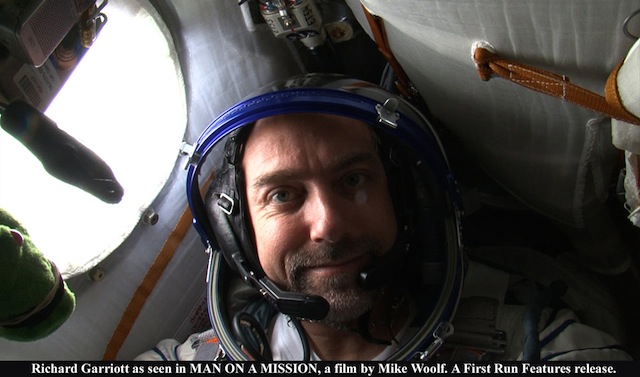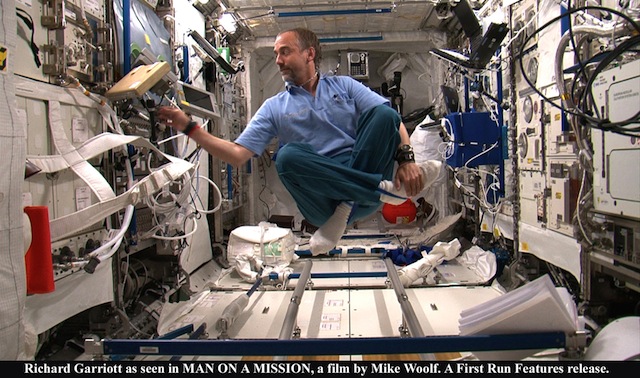Richard Garriott is best known as Lord British, the designer of video games that have been enjoyed by tens of millions of people over the past three decades. But thanks to the documentary film Man on a Mission: Richard Garriott’s Road to the Stars, he is also now known as a pioneer in commercial space travel who paid about $30 million for a trip to the International Space Station.
The story shows how Garriott dreamed of following his father into space, only to be stymied by NASA’s restriction on prohibiting anyone with eyesight flaws requiring glasses from being an astronaut. At 13, with his hopes dashed, Garriott started plotting how to launch his own trip into space as a civilian. His entrepreneurial approach to space travel eventually paid off with the trip of a lifetime in 2008.
The film, by Mike Woolf and First Run Features, tracked Garriott’s trip into space on board a Russian Soyuz rocket. In chronicling his preparations, the filmmakers went behind the old Iron Curtain to reveal the way the Russians train their cosmonauts at a once-secret training base in Star City, near Moscow, then send them into space from a base in Kazakhstan.
Beyond making games, from Ultimate to Tabula Rasa, Garriott has been one of the primary investors in the X-Prize and Space Adventures, the private company that takes private citizens to the space station. He used his passion and profits from games to make his space dream come true.
The film is touching because Richard relied upon the advice and help of his father, Owen Garriott, a scientist-astronaut who flew aboard the Skylab space station in the 1970s. The younger Garriott is the first second-generation astronaut in the U.S.
We interviewed Richard about the film, which is available on demand and is showing in select theaters. Here is an edited transcript.
GamesBeat: Thanks for doing the call, and congratulations on getting the movie out.
Richard Garriott: Yeah, thank you. We’re very excited about it. We broke the top 10 on a number of the documentary charts, so not bad so far.
GB: That’s good, that’s good. So how far back did you guys start thinking about that as a documentary? The footage seems to go pretty far back.
Garriott: Well, interestingly, we were at a friend’s wedding together, and I knew that these guys produced documentaries, I’ve known them for some years, but honestly it hadn’t really crossed my mind. As you might imagine, preparing for a space flight is a non-trivial thing to arrange. Especially while you’re still trying to keep your day job going, if you know what I mean. It really had not crossed my mind at all. But the year before I started training was a year where I had to do a lot of medical preparation for the flight, including a surgery to remove a chunk of my liver. While at my friend’s wedding… When you get together, you say, “What are you up to?” “Well, what are you up to?” I was going around showing off this 16-inch scar I had on my belly from having a chunk of my liver removed, since it was the most recent event in my life, and that’s when Brady (Dial) and Mike (Woolf) both came up to me and said, “Richard, surely by now you have had somebody think about documenting this, haven’t you?” I said, “Well, no, honestly I haven’t.” They said, “Richard, we beg you, let us come to Russia with you to document this, this is such a special opportunity. They already knew that my father was an astronaut, that I would be becoming the first second-generation astronaut, but they were completely unaware of the medical activities, the training I was about to jump into. As soon as they mentioned it, it made enormous sense to me too. And from that point forward they became my surrogate family over in Russia.
GB: Did you know their work from before, had you seen other things that they had done and liked it?
Garriott: Yeah, Brady has actually done a very well-known, well-received IMAX movie about cowboys. Mike Woolf and his team here in Austin, I’d seen their work in advertising and music and other areas. I’ve known both of their work for some time. It had really never crossed my mind, thinking far enough ahead to think about documenting my trip.
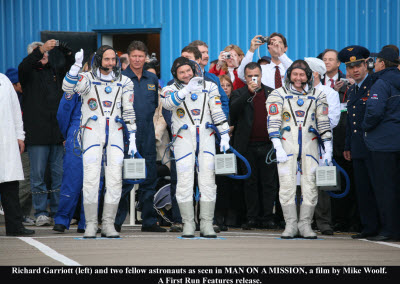 GB: What was the idea that drew them? The connection between you and your father, then?
GB: What was the idea that drew them? The connection between you and your father, then?
Garriott: No… They knew that civilian space flight was a new industry that I had helped open. And if you combine that with the fact that… I’m the one that helped open it, I’m one of the first people ever to fly, I’m a generational astronaut, that just added up to them… They were saying, “Look, this is definitely a historical moment.” And they also knew that nobody in the West, especially, has ever really had the chance to see the space program from the Russian perspective. And so they knew the footage that we’d be able to capture was not only historical, but also would have this very unique aspect of living and filming from the Russian side of the international space program.
GB: So it had a lot of different hooks there.
Garriott: The story threads, as is often the case with documentaries — you sort of discover the story as you go along. The experiments I was going to perform weren’t set at the time, how we were going to arrange the mission, what part my dad would play through the whole thing. Not this film, but I mean… What his role would be through my mission had not even been fully revealed to us. Even by then. We just knew it was an important story to capture.
GB: How do you feel about how the film turned out?
Garriott: Of course, I think it turned out great. It’s funny, the first rough cut that I saw was about three hours long. When I saw the three-hour version I was just, “Wow, that’s truly amazing, I don’t know how they’re going to ever get this down to an hour and a half.” Because by definition you think they’re going to lose half the content. When they cut it down to 90 minutes, I actually looked at it and said, “Wow, not only is this much better, but I really couldn’t tell you what, if anything, was left on the floor.” It was such a more powerful movie, just by giving it a good editing. Interestingly, I have seen them try to get it down to 60 minutes, because they were debating a 60-minute release as well for television. At 60 minutes you can tell there are some story threads that have had to be left behind. But at 90 minutes I think it’s a really powerful documentary.
GB: The whole story, it has quite a few twists and turns there, it seemed like there were a lot of times where everything could have been cancelled, right?
Garriott: Oh, yeah. In fact, there’s even more that aren’t in the film. But for me, my journey to space had lots of potential dead-ends. The first was my investments in a company called Spacehab, which did fly hardware, but NASA would never let them take systems. Then, when I finally did arrange for the space flight, the internet stock market crashed, so I had to sell my seat to Dennis Tito. But there’s even things, all the way up to the eleventh hour… Of course there’s the medical issues. When they first found that anomaly on my liver, they said, “By the way, you have a disqualifying medical condition.” It could have ended right there. But literally, right up until days before the flight, there were international politics that in theory could have derailed the whole thing. It’s interesting. Even I was holding my breath and crossing my fingers… Up until you board the rocket and it’s about to start. Then you say, “Well, nobody can stop us now.”
GB: You also had the laser eye surgery a long time earlier, too.
Garriott: Yeah, and that turned out to be good fortune. I’m actually the first person who’s ever flown who’s had corrective eye surgery, because it’s been illegal for astronaut candidates. As soon as I was flying, NASA suddenly became very interested in studying my eyes, because I was the first test case of this condition.
GB: It’s really against all the odds there, that it all came through.
Garriott: But you know, what I think is really interesting about it is that, even if it hadn’t come through this last time, I would not have given up on it. I’m very confident, if I hadn’t gone in 2008, I would have gone soon after. Even if I was still pursuing it right now, I would not have given up on this. I’m a big believer that anyone can tackle hugely difficult problems, as long as they have patience and intelligence and stick-to-itiveness. You can tackle pretty amazing things.
GB: What was the earliest period when you dreamed this up? How many years ago, do you think, did you start thinking about space travel?
Garriott: I know exactly when it happened, because I remember the moment very well. When I was very young, of course, my father was an astronaut and all our neighbors were astronauts. So as a kid I didn’t grow up and say, “When I grow up I want to be an astronaut,” because I sort of believed that everybody went. It wasn’t something you had to decide to do. It was just a default assumption, that everybody would go. It was when I was 13 years old, and one of the NASA doctors told me that because I needed glasses I was not eligible to be an astronaut, thereby basically telling me that I was no longer a member of the club that my parents and family and friends were all members of. It was right after that, right after a short bout with disappointment, where I came up with the plan of saying, “Well, if I can’t go with the government space program, I’m going to have to bring into existence a civilian space program.” So maybe about the age of 13.
GB: How soon did you find some of the people who could make it happen?
Garriott: Well, I’d say in 1998, when I met Eric Anderson, which then connected me through to Peter Diamandis and the rest of the founders, the group of us that put together the X-Prize, the ZERO-G Corp. and Space Adventures. That was when it was really busted open.
GB: And it still took quite a long time after that.
Garriott: Well, ’98 to 2008, it’s only 10 years after that. To bring an industry into existence and fly, I don’t think that’s too bad.
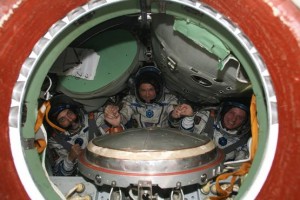 GB: I know Tabula Rasa was going on at the same time there, but I didn’t really remember much mention of it in the movie. Was that by design?
GB: I know Tabula Rasa was going on at the same time there, but I didn’t really remember much mention of it in the movie. Was that by design?
Garriott: Well, in fact there’s an homage to Tabula Rasa, even during my flight itself. During launch, I had my flight data file in my hand, I had a moment where I knew the camera would be facing me, and so I actually displayed a message written in the symbolic language I created, that only the gamers that follow my work could read. So I tried to include gamers with everything from flying the DNA up into space, the secret message, other things. I’ve tried to remain as well-connected to gamers as possible during my flight.
GB: Was it tough doing that balancing act, balancing the game and the space travel at the same time?
Garriott: Well, fortunately in my case the medical pre-qualification that I did throughout the year of 2007 really didn’t require much time. It just meant that once every few months I had to go check in with a doctor, most of that was pretty innocuous. Other than the surgery. That took me offline for about a month. Just because it was a serious surgery, it had recovery time. So fortunately, by the time I went to Russia to even begin my training, Tabula Rasa had already been out for some months. The timing was not accidental. When I first realized that the possibility would be open for me to fly again, I spoke with T.J. Kim, who is the president and founder of NCsoft, and together we picked the year that was safely beyond Tabula Rasa. That way we’d finish Tabula Rasa first and then I could go take the space flight. (Garriott had to go to court to recover a $28 million award from NCsoft after the company let him go).
GB: The relationship with your father was very interesting. Had you guys also planned on him being very involved in all of the mission work?
Garriott: Well, that sort of “evolved,” I’ll call it. Of course, having an expert at that level, having one of the only other people who’s ever left the planet… I think I was number 483 to leave the planet. I suspect… I don’t even know what my dad’s number is, I’ll have to go look it up. But he’s probably somewhere below 100 anyway, maybe 50 or so. Having someone who has had so much experience in a field where almost nobody on earth has had any experience was really a great asset. I wouldn’t say, when I conceived the idea of going, that at that moment I assumed my dad would take such a major role. But it just became obvious over time, as I’m trying to think of experiments to do, commercial activity to do, there’s no better contact than my dad. When I was planning out, scheduling day by day how to sequence things to make sure that I’m at the window to take the right pictures, I’m at the ham radio to make the right communications, fill in the rest with experiments ad hoc… That always changes based on the exact launch date, and also some experiments take too long or you have excess time, so my dad not only helped develop the original schedule, but then really ran the mission control team while I was on orbit as well. It ended up working out fantastically, but I wouldn’t say it was predetermined to be that way.
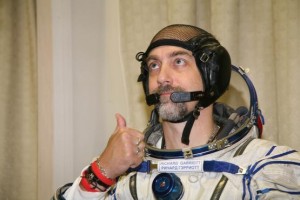 GB: (Your father’s presence) made the movie more emotional, it seemed like.
GB: (Your father’s presence) made the movie more emotional, it seemed like.
Garriott: Agreed. What’s funny is that most people who know my dad, and even the way I’ve commonly described my dad, although this description doesn’t really come out in the movie… If you had to say, “Richard, give me a sense of what your father’s personality is like,” I would tell you, unabashedly, with no reservations, and with great precision, “My father is Spock.”
That is literally what I grew up with, a father who was relatively… Not just relatively, utterly non-emotional. With the kids and the family. He was very logical, rational, uses words very carefully. In my home, when we grew up, if somebody said something like, “Do you agree?” you couldn’t say “Right.” Because “right” is a direction. It’s ambiguous as to whether it means “correct” or a direction. We were… It was insisted, in my household, that we use “correct,” not “right,” as an affirmative response. And so I still have very…what I’ll call “scientific” filters on my casual speech, because that’s the circumstances under which I grew up. That actually adds to how meaningful it was for my father and I to do this together. We really had a great time bonding in a way we didn’t get a chance to as father and son in my younger years.
GB: That was the part that made it more interesting. That was good to watch. The Russian side of things was also very interesting too. I guess I can’t think of another documentary like that.
Garriott: Well, no. In fact, the reason why you can’t think of one is because there isn’t one, if you know what I mean. When we were taking cameras around to Russia, we were constantly being told, “This is the first time Western cameras have been into these places.” Brady and Mike were very good about asking for access to things that… The first answer was “No, of course not, that’s never been done, it’s not allowed.” And then we continued to ask and ask and ask until finally people said, “Oh, well, okay, c’mon in.” We really did get footage in this film that has never been seen before. I think that’s one of the reasons why it has particularly special significance.
GB: So was space as much fun as you expected it to be?
Garriott: Of course! But what’s interesting is… It was in very different ways than what I would have guessed. For example, launch you think of as this loud, shaky, scary moment. In fact, on a liquid-fueled rocket like the Soyuz, it’s almost perfectly silent and smooth on the inside. It’s much more cerebral, it feels much more like a ballet move, lifting you ever faster into the sky, than it does a sports car dropping the clutch at a green light. And the same thing’s true for re-entry. Also very smooth, and almost perfectly silent, even as you plunge into the atmosphere and create a plasma hotter than the surface of the sun that’s melting the vehicle around you. Out the window is a pretty surreal visual of the vehicle melting away, it’s only four inches from your shoulder. But it’s very smooth, very calm, not remotely scary, really.
GB: It must have been strange to have this whole side of things going on, and the game side of your career also happening at the same time. It’s kind of boggling that you could focus on both of them.
Garriott: This has been true for my whole career. Think about the fact that I’ve made two trips to the South Pole, meteorite hunts in Antarctica, I’ve been on three safaris throughout Africa, I’ve been dugout canoeing down the Amazon, four deep submersible expeditions down to the Titanic, hydrothermal vents and treasure wrecks… None of those were small, those are the big expeditions, those are all things that took up to a month of time. I actually think that the games and the exploration are conjoined, deeper than most people think.
I don’t think of it as, “This is what I do to take off, as a vacation between working.” I really do sincerely believe that the joy and the learning that I gain from… What I’ll call the inspiration that I get from exploring the real world, the feeling of exploration and joy that I get out of exploring history and science, is the same that I get enjoying wonderful virtual worlds other people have created.
And in my mind, that same appreciation is what I try to create, not only in the virtual worlds that I create, but also in the homes that I build, the haunted houses that I do. That sense of the joy of exploration is universal. Whether it’s participation or creation, it’s the same motivation.
GB: It seems to take an incredible amount of energy for any one of those endeavors.
Garriott: Right. And I like to do ’em all, which means I’m never bored.
GB: Now that you’re back on earth, did the flight change you in a particular way?
RG: Well, there’s no question that space travel, and especially looking out the window back at the earth, is a very moving, life-changing event. Before the flight I definitely would have said that… I would have described myself as an environmentalist. In fact, most of my charitable activities are in environmental areas. However, my personal lifestyle was not exactly environmentally-minded, in the sense of… I’m a horrible abuser of electricity, I have exotic sports cars that guzzle gas, etc., etc. I generate huge amounts of trash. But if you look at my life since then, I’ve decreased my footprint dramatically. I’ve added I don’t know how many square meters of photovoltaic power collection to bring myself to virtually neutral energy consumption. I’ve changed out all my vehicles to cars that are now much more fuel-efficient. I’m building my own electric car as well. So now I would say that I walk the walk a lot better than I did before.
GB: How about on the game side? Are you interested in making certain kinds of games as a result?
Garriott: My motivations in gaming I don’t think have changed much. I think that I have some new experiences that will hopefully allow me to layer in new levels of experience into the games, orthogonally… What I mean by that is, I’m not going to go make a space simulation game by any means. But to me I think if anything it’s redoubled something that I already knew I believed in.
I’m a devout believer that role-playing is a very powerful experience, and innately has what I’ll call teaching layers inside of it. And I also believe that the very best stories to be told in any medium, whether it’s paper or movies or interactive, are stories that reflect to the reader or to the player something about themselves. They’re enriching to you as a participant. Your time that you’ve spent, that you’ve invested in participating with a game or a book is time that, when you’ve finished, you feel that… “I have grown through my participation.”
That you’ll see me do even more than I have before, although as you know that’s one of the hallmarks of my game creations anyway. I like to put ethical parables, reflect to the player their behavior or their beliefs and challenge aspects of how they play and how they think. If anything, I feel even more strongly in that area.
GB: What’s your view of the future of commercial space travel?
Garriott: I think it’s going to be very robust. I think that commercial competition in space travel is going to bring the price down. It’s already brought it down tenfold. I believe it’ll bring it down a hundredfold. Once it’s down a hundredfold, even the little bit of commercial work I did in space would pay for my space flight. As soon as the price drops a hundredfold, which all the commercial guys think they can do, I’ll be going to space a lot more often.
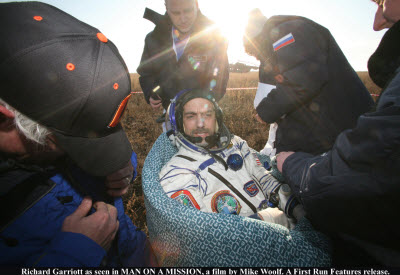 GB: So you plan to go up some more still?
GB: So you plan to go up some more still?
Garriott: I might just sit up in my window in orbit and write the next game.
GB: This was probably your first extensive contact with the Russian folks, too. What did you think of that whole experience? That side of the experience.
Garriott: It’s really funny, because I think most Westerners, including myself, or myself prior, have a very shallow and inaccurate impression of Russian technology, Russian social customs, things of that nature. I was very pleasantly surprised to get over there and find… I’ll give you a little taste of it. When I was young, when the astronauts would get together to celebrate each other and their space flights, to toast the ones going up or hurrah the ones who just returned, the parents and especially the men, the astronauts, would go off on their own and do their activities. The families weren’t nearly as big a part of it, you might say.
One of the things I was very, very pleasantly surprised by is that as soon as I arrived over there in Russia, you’d be walking around in Star City, other groups would be gathering to have a meal, and when they would see you walking down the street they would open their doors and invite you in. They’d say, “Look, this is a community, whether it’s grandparents, astronauts, or their children, socially we’re all in the same fold.” They’d talk about their friends and family and colleagues in orbit in a way that shares it across the generations. I never saw that done here in the United States. That was just a small taste, there were all kinds of other things about Russian society and Russian scientific and engineering process that I’ve become a really big fan of.
GB: It’s wonderful to watch that whole experience on film, I’m glad you guys made a movie out of it.
Garriott: Me too. Again, if it wasn’t for Brady and Mike I wouldn’t have done it at all. But as you can imagine, the quality of what we’ve ended up with is so good that I believe… I’m really pleased and proud that they brought it up and that I was fortunate enough to have them participate.
GB: Are you getting some interesting reactions from people who’ve watched it as well?
Garriott: Yeah, it is interesting. There seem to be two kinds of people. And I would actually break them out into… I’m speaking to you personally when I say that they are “our” kind of people, meaning technology-oriented people, gamers, nerds, technocrats. Anybody who has any kind of science and technology bent has really been enjoying the movie. The only people we’ve ever seen so far that have not really been inspired by it are people who are not “technocrats,” we’ll call them broadly. But so far, that is the target audience, if you know what I mean. That’s our core audience, that’s the gaming audience, and so I think especially for the gaming audience, this movie is particularly good.
GB: There are lots of interesting moments in there. I liked the part where they were making the mold of your body.
Garriott: Yeah. Let the plaster become semi-hard before they *shloop* drag you out of it with a big suction crane.
GB: Anything else you would like to add here? Do you have any sense yet of how well the movie has done?
Garriott: Well, so far it’s doing very well. I think I mentioned at the very beginning, we’ve broken the top 10 on most of the digital distribution methods for documentaries. Considering this is something that… At least for me, having conceived it just a couple of years ago, the fact that we now have a top-10 documentary out there I think is phenomenal.
Photos courtesy First Run Features and Richard Garriott.
VentureBeat's mission is to be a digital town square for technical decision-makers to gain knowledge about transformative enterprise technology and transact. Learn More

